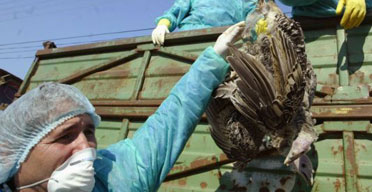
The UN health agency today tried to quell growing alarm over the spread of bird flu as EU veterinary experts held an emergency meeting to agree ways of trying to prevent the spread of the virus.
A spokesman for the World Health Organisation insisted the risk of human infection was "very low".
British scientists yesterday said the virus found in Turkish poultry was the deadly H5N1 strain that health experts fear could mutate into a human disease with the potential to kill millions of people worldwide. The virus has killed at least 60 people - mostly poultry farm workers - in Asia since it first emerged in Hong Kong in 1997.
A Turkish hospital confirmed today it was keeping nine people under observation and had tested them for possible bird flu after the death of 40 of their pigeons, state-run Anatolian news agency said.
"Acting on a tip-off, we took the family which owned the pigeons and the neighbours who made the tip-off, in all nine people, to the hospital," the agency quoted local health official Osman Ozturk as saying.
However, a WHO spokesman, Dick Thompson, said it was important to keep the risk to humans in perspective.
"People confuse it with pandemic influenza, but they're very different diseases," he said. "If people just paid attention to the human risk [from bird flu, they would understand that] the possibility of infection is very low."
The EU meeting is expected to recommend separating poultry from areas such as wetlands or other areas known to be frequented by migratory birds. Free-range birds may also be brought indoors to reduce the chance of contact with wild birds.
The European commission will send EU veterinary and laboratory experts to Bulgaria and Turkey, after both requested help, a spokesman said.
It was revealed yesterday that a type of H5 virus had also killed birds in Romania. Confirmation of whether the strain is H5N1, which had been expected today, has been delayed for 24 hours because the samples heading for a laboratory in Weybridge, Surrey, had been held up at border checks.
"We have no comment or criticism to make about customs procedures," European commission health spokesman Philip Tod said. "It is perfectly understandable that there are procedures in place to deal with packages of this kind.
"These are sensitive packages which have to be treated in accordance with rules and regulations governing consignments which could be dangerous. There was a delay on the Romanian side of the border and at the UK end."
Yesterday, the UK's chief veterinary officer, Debby Reynolds, said it was already assumed that the Romanian birds were carrying the H5N1 virus. All imports of poultry meat, eggs and feathers from Romania and Turkey have already been banned.
Experts on migratory routes, wild birds and hunting have joined the emergency meeting of the EU's standing committee on the food chain and animal health.
Once new preventive measures are in place, EU governments will have to keep Brussels informed about how they are being applied, to enable coordinated control and close monitoring of the potential spread of the disease in the EU. "Each member state will define which areas are at risk and apply the necessary measures to separate wild birds from poultry," a commission spokesman said.
The French prime minister, Dominique de Villepin, today cautioned against panic over bird flu. He said the EU was "totally mobilised".
Last night, British health officials called for elderly people and children in high-risk groups to get the winter flu jab, effectively urging the inoculation of more than 10 million British pensioners and approximately 1 million children.
The fear is that flu sufferers who come into contact with avian flu could act as a catalyst for the virus to mutate into a form which could be passed from person to person. Were that to happen, virologists predict that millions could be killed globally.
A British official said: "We recommend seasonal vaccination for all those over 65 or all those who suffer from ailments that put them at higher risk from flu such as asthma, diabetes or serious heart or lung conditions."
The EU health commissioner, Markos Kyprianou, has urged countries to stockpile antiviral drugs to prepare for a possible pandemic.
Bird flu is a potential disaster for Europe's farmers but there is no evidence the virus has mutated into a form that passes easily between people.

